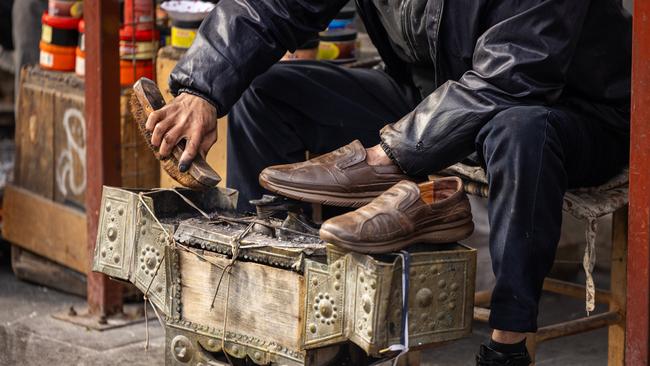I've fallen for tourist scams around the world, beware of these signs
Scams are devised to take advantage of your natural decency, but there are red flags you can look out for.

Lifestyle
Don't miss out on the headlines from Lifestyle. Followed categories will be added to My News.
Thirsty and disoriented in a parched cemetery on the outskirts of Marrakech, we understood the only way out of this unsolicited tour was through it.
A simple request for directions from a schoolboy who was ostensibly keen to practise his English had seen us handed over with polite insistence to a persuasive shopkeeper, and finally onto a seemingly well-meaning elderly man.

But the veneer of altruism faded as we were bustled through alleys where chickens were losing their heads into spice shops where the pressure to purchase was weighty and, finally, to the man’s own house, presumably. It was here that much fitter, younger men appeared with trays of mint tea.
Photographs with our smiling tour guides/captors were snapped and demands for payment for the “tour” were made. It was clear that to be chaperoned back to our point of origin, we had to hand over the money. Pay we did. And hindsight says it was a small price for a cautionary tale that has enjoyed plenty of airtime since.
Travel is full of potholes – it’s all part of the experience. But when an intricately planned deception ensnares you, it can tarnish your view of a place and leave you humiliated. Perhaps I’m particularly susceptible to scams, but even as a frequent traveller, I’ve been done plenty of times. Here are a few common ruses to watch out for.

The Istanbul shoeshine
Google this one and you’ll see it’s well-documented. The set-up goes like this: a shoe-shiner pretends to pack up his kit and walk off, dropping his brush, apparently accidentally and unawares. As you’re a decent human, you pick up the brush and hand it to him, triggering a cascade of disproportionate appreciation and an insistence he shine your shoes in thanks, even if you happen to be wearing sneakers.
Once the job is done, money is demanded, despite the strong inference this was a gratis situation. A nearby policeman who watched me being hoodwinked just smirked and asked how much we paid. So don’t expect help; it’s an ecosystem and everyone gets fed. Except you. So don’t pick up the brush.

Taxi tricks
It feels obvious, but often when you’re in the moment, you forget things don’t always operate as they do back home. From fake meters to inflated prices and meandering detours, there are plenty of ways to get taken for a literal and metaphorical ride.
The best tip is to research how much a trip should cost by asking a reliable local, then negotiate the rate upfront. Some personable drivers may offer an unofficial tour that sounds incredibly cheap, but the penny drops when you’re taken to a series of friends’ stores rather than points of interest and you’re intimidated into buying freshwater pearls or a handsome Berber rug. Which looks lovely in my living room, by the way.

Beware sweet old women
This one can take place anywhere, but often happens in crowded tourist spots where disappearing acts are easy to accomplish. Sweet-looking, often toothless old women make an approach, sprigs of herbs outstretched, offering blessings.
It can go two ways. First, you might find yourself entrapped in a blessing too late, confused by what’s going on and too polite to give a septuagenarian the brush-off. Next minute, money is being elicited. Or, if you’re particularly naïve, your valuables may be popped into a bag to be blessed. A sleight of hand leaves you parting ways holding a bag of worthless trinkets, while the suddenly spritely old crone has legged it with your gold watch.
But heed this final word of comfort. Scams are devised to take advantage of your natural decency. So if you do find yourself swindled, at least take heart in the fact you’re a nice person.
Originally published as I've fallen for tourist scams around the world, beware of these signs




